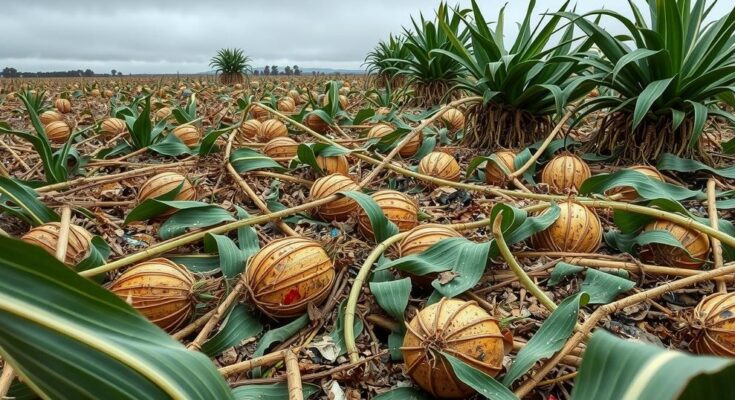Months after Hurricane Helene’s destruction, farmers across the South continue to face significant challenges in recovery. The storm, with damages estimated at over $10 billion, primarily impacted crops like cotton and poultry, crippling many farmers’ livelihoods. As regions begin to recover, emotional and economic tolls loom large, necessitating urgent governmental aid and support.
Farmers across the South are still grappling with the aftereffects of Hurricane Helene, which devastated agricultural operations in the region months ago. The storm, which struck Florida as a Category 4 hurricane on September 26, wreaked havoc on crops, uprooted timber, and destroyed vital farming equipment, leading to economic losses estimated at over $10 billion. The impact on cotton growers, particularly those like Chris Hopkins in Georgia, was severe, with many farmers experiencing substantial crop losses, delayed harvesting, and overwhelming emotional strain.
In Georgia, Chris Hopkins reported that he lost approximately half of his cotton crop, which he could not harvest due to the extensive damage caused by the hurricane. This sentiment is echoed by farmers throughout the affected areas as they confront the daunting task of recovery. The economic ramifications of the storm extended beyond crop destruction, impacting associated agribusinesses and processing plants, further exacerbating recovery challenges for farmers.
The losses experienced by farmers have prompted state and federal responses, including emergency loans and discussions of disaster aid. However, there are constraints on the accessibility of these funds due to state regulations. Farmers like Jeffrey Pridgen, who lost chicken houses and their corresponding revenue, stress the urgency of assistance to rebuild their operations sustainably. Georgia’s poultry sector alone faced a staggering $683 million in losses, highlighting the widespread impact of the storm.
According to experts, while the hurricane’s costs are monumental for local economies, its influence on consumer prices may remain limited due to available crop supplies from other regions. Still, the long-term effects on production capacity will be felt as farmers strive to recover over the coming years. The resilience and determination of these farming communities will be crucial as they navigate the challenging road ahead, compounded by pre-existing economic hardships in the agricultural sector.
Hurricane Helene made landfall in late September 2024, striking Florida with unprecedented force before moving through several Southern states, devastating agriculture in its wake. The hurricane primarily affected crops during the fall harvest, a critical period for farmers. The aftermath included severe infrastructure damage, particularly in Georgia, where farmers faced emotional and financial tolls due to crop losses and the devastation of poultry and cotton production. Trucks and harvesters were often reassigned for cleanup rather than harvest, leaving farmers in a state of uncertainty about their future. As the South begins to recover, the overarching impact of this hurricane highlights the vulnerabilities within agribusiness, particularly for crops like cotton and sectors such as poultry processing that are critical to the regional economy.
In summary, Hurricane Helene has left an indelible mark on farmers throughout the South, with damages that extend well beyond immediate crop loss. With estimates of over $10 billion in losses affecting farms and related sectors, the path to recovery will require significant financial assistance and time. While government responses indicate recognition and support for affected farmers, the challenges associated with rebuilding and adapting to these losses will necessitate unity and resilience in the agricultural community.
Original Source: mynorthwest.com




